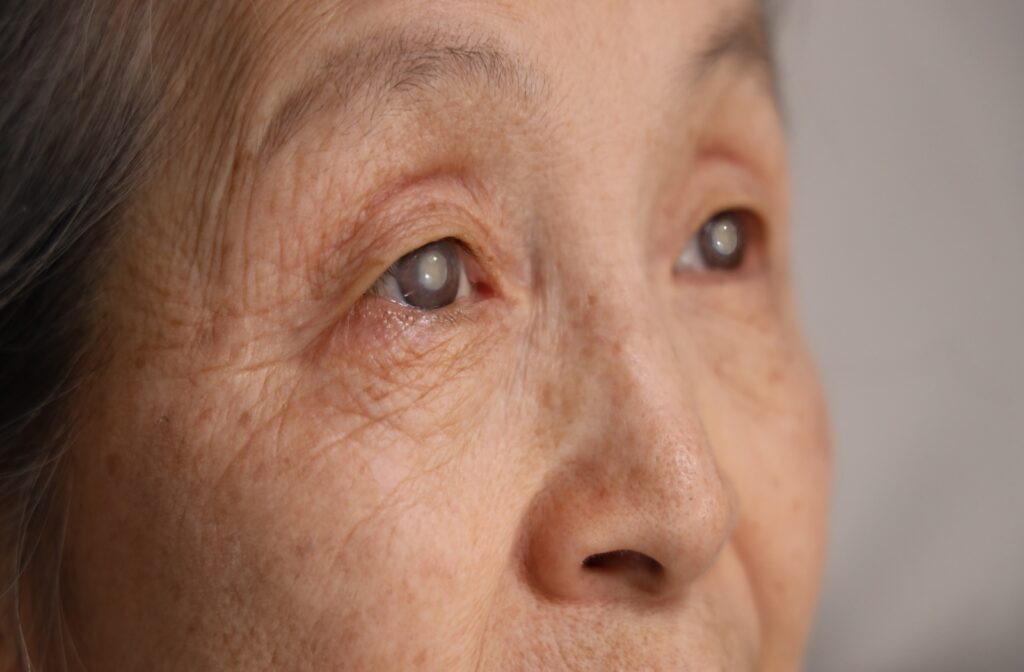If you’ve ever noticed tiny specks, strings, or cobweb-like shapes drifting across your vision, you’re not alone. Floaters are shadows that “float” across your field of view, caused by clumps of broken-down fibers scattered within the middle of your eye.
Most floaters are harmless and are more common as we age. However, a sudden increase in their number or the presence of accompanying symptoms, like flashes of light, can indicate a more serious issue.
Regular eye exams are crucial in monitoring these changes and maintaining eye health.
What Causes Floaters?
Eye floaters form when the vitreous humor—the gel-like substance inside your eye—begins to shrink and form clumps. These clumps cast shadows on the retina, which we perceive as floaters. Common causes of floaters include:
- Aging & natural vitreous changes can cause floaters to become more noticeable after age 50
- Eye Injuries & trauma to the eye can disturb the vitreous & lead to floaters
- Inflammatory conditions, like uveitis (inflammation inside the eye), can cause floaters to appear
- High myopia (nearsightedness) can stretch eye tissue, increasing the likelihood of developing floaters
- Cataract surgery or other eye procedures can cause floaters as a side effect
- Diabetic retinopathy can contribute to the development of floaters by affecting the blood vessels in the retina
While floaters are generally not a cause for concern, an eye doctor should evaluate any sudden changes.
When Should You Be Concerned About Floaters?
Most floaters are benign, but some may signal serious eye conditions like retinal detachment. Seek immediate medical attention if you experience:
- A sudden increase in floaters
- Flashes of light in your peripheral vision
- A shadow or curtain-like effect over part of your vision
- Blurred or reduced vision
These symptoms could indicate a retinal tear or detachment, requiring prompt intervention to prevent vision loss.
Are Floaters Connected to Cataracts or Dry Eyes?
While cataracts and floaters are both common age-related eye conditions, they are not directly connected. However, floaters may become more noticeable after cataract surgery.
Similarly, dry eyes don’t cause floaters. Notably, both conditions can contribute to visual discomfort and can be symptoms of other eye conditions.

Understanding Dry Eyes & Floaters
Dry eye occurs when your tear glands don’t produce enough lubrication for the eyes, leading to irritation, redness, and a gritty sensation. Although dry eye doesn’t cause floaters, experiencing both conditions simultaneously can disrupt visual comfort.
If you experience persistent dryness along with floaters, an eye exam can help determine the appropriate treatment.
Can Floaters Be Prevented?
While floaters can’t be prevented completely, certain lifestyle choices can support overall eye health and reduce risk factors:
- Stay hydrated
- The vitreous is mostly water, so adequate hydration helps maintain its consistency
- Eat a nutrient-rich diet
- Omega-3 fatty acids & antioxidants support eye health & may help slow vitreous degeneration
- Protect your eyes
- Wearing sunglasses & safety goggles reduces the risk of eye trauma
- Limit your screen time
- Reducing digital eye strain can improve overall eye comfort
- Book regular eye exams
- Routine check-ups can monitor eye changes to help catch potential issues early
How Are Floaters Diagnosed?
An eye doctor can identify floaters through a comprehensive eye exam:
- A dilated eye exam enables your optometrist to see a detailed view of the vitreous
- Optical coherence tomography (OCT) can capture a high-resolution image of the back of the eye
- Ultrasound imaging is used when the retina is difficult to examine due to cloudy vitreous or other obstructions
These tests help determine the cause of floaters and whether further monitoring or treatment is needed.
How to Manage Floaters
In most cases, floaters don’t require treatment. However, if they become bothersome, you can try the following strategies:
- Move your eyes or shift your gaze to help move floaters out of your direct line of sight
- Adjust lighting, as softer, indirect light can help make floaters less noticeable
- Give your brain time to adapt, as many people can learn to ignore floaters
- Blink frequently to help refresh the tear film, improving comfort & reducing strain from dry eyes
- Use artificial tears if you experience dry eyes, as lubricating eye drops can enhance visual clarity & comfort
Treatment Options for Severe Floaters
If floaters significantly interfere with your vision, treatment options may include:
- Laser vitreolysis to break up larger floaters
- Vitrectomy to surgically remove & replace the vitreous
Most people don’t need intervention, but your eye doctor can help determine if treatment is necessary.
Eye Floaters & Aging
As we age, eye floaters become more common. While floaters are typically harmless, staying aware of any changes in your vision is essential.
Since age-related eye conditions such as cataracts, macular degeneration, and dry eye syndrome can also develop later in life, maintaining routine eye exams becomes even more crucial.
People over 50 are more likely to develop posterior vitreous detachment (PVD), a condition where the vitreous separates from the back of the eye, often leading to increased floaters.
Although PVD isn’t sight-threatening or harmful, in some cases, it may lead to retinal tears or detachment, an eye health emergency requiring prompt evaluation by an eye specialist.
Prioritize Your Eye Health
Eye floaters are generally harmless but can occasionally signal underlying eye conditions. Regular eye exams allow your eye doctor to monitor any changes in your vision and eye health before they develop into significant issues. At Vision Veritas, our team is committed to providing personalized eye care to help keep your vision clear and healthy. If you’re concerned about floaters or need a comprehensive eye exam, book an appointment with us today.





